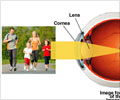A new investigation warned people who wear contact lenses have been warned about a new fungus that can lead to blindness.
An investigation has found that 200 people in the United States and the Far East who use contact lenses have contracted an infection that could lead to blindness.
Investigators have warned contact lens users about a new fungus infection called fusarium keratitis. This warning has lead to the withdrawal of one type of a lens cleaning solution that has been used by many of those affected.Researchers have also explained that many people who follow poor lens hygiene are also at a greater risk of catching the infection that has been described as the most severe complication that could be related to contact lens wear.
Sources have indicated that many the people who have been infected in the outbreak are expected to undergo corneal transplants to fully restore their sight. Experts have advised that though it was still rare in Britain, any person travelling to hot and humid places, where the fungus is very common. They have advised that all such travellers would be safer by switching to daily disposable contact lenses so as to avoid the risk that could be associated with wearing long lasting lenses.
Scientists at the Singapore Eye Research Institute (SERI) had reported in today’s edition of the Journal of the American Medical Association, of three outbreaks, which they feel, could suggest, this occurrence could well be a part of a global problem, with serious implications for millions of lens wearers worldwide.
The scientists have further stated that the infection rate in Singapore that was about 2.35 cases out of every 10,000 people wearing contact lenses was a very astonishing figure. They also stated, "We believe that Singapore is facing a new and unprecedented outbreak of fusarium keratitis and that this is the first time that such an outbreak has been reported among contact lens wearers anywhere in the world.” “ By highlighting this serious outbreak of fusarium keratitis among contact lens wearers in Singapore, we hope to alert physicians and other eye-care clinicians worldwide to maintain a high index of suspicion for fungal infections."
The researchers have explained that 7.4% of those infected in Singapore needed urgent surgical intervention to treat acute corneal perforation or to stop the condition from developing. They further stated that it is likely that more cases may require subsequent corneal transplantation for residual scarring.
Advertisement
Professor Roger Buckley, a former president of the British Contact Lens Association, has however suggested that the so called apparent link with the MoistureLoc fluid would be simply because it was so very commonly used in Singapore, explaining that the cause most likely would probably be lying in other areas.
Advertisement











